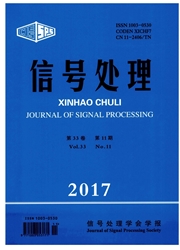

 中文摘要:
中文摘要:
认知无线电技术是建立在授权空闲频谱或非授权频谱基础上,主用户(Licensed user)享有优先频谱使用权,为保护主用户的正常需求,提高探测数据的可靠性,提出了一种新型两人纳什议价合作感知NBS算法,利用两个用户的合作感知信息,根据认知用户(secondary users)与主用户基站的距离和能量的差异,自适应的调节能量检测门限。并将多用户合作感知指派分组为两人纳什合作议价问题,结合“AND”规格融合每组感知数据,在保障主用户通信基础上,提高频谱利用率。仿真结果表明,NBS算法可有效的提高数据可信度,该算法与“AND”数据融合规则相比,感知数据的探测概率显著提高。
 英文摘要:
英文摘要:
As cognitive radio uses the spectrum which is unlicensed and licensed but under utilized, the licensed users still keep primary access rights to its spectrum, potential secondary users have to vacate the spectrum in case the licensed user claims it. To improve the credibility of the sensing data and make a final decision at the secondary base station, a novel Nash Bargaining Solution (NBS) algorithm based on two secondary users' cooperative sensing is proposed. All secondary users are assigned depending on the Hungarian method. Simulation results show that the novel algorithm can improve the credibility of the sensing data, and the detection probability is thereby increased obviously at the same false alarm probability.
 同期刊论文项目
同期刊论文项目
 同项目期刊论文
同项目期刊论文
 Signal Constellations Design for Differential Unitary Space-time in MIMO-OFDM System over Frequency-
Signal Constellations Design for Differential Unitary Space-time in MIMO-OFDM System over Frequency- Cross-Layer Combining of Power Control and Adaptive Modulation with Truncated ARQ for Cognitive Radi
Cross-Layer Combining of Power Control and Adaptive Modulation with Truncated ARQ for Cognitive Radi 期刊信息
期刊信息
